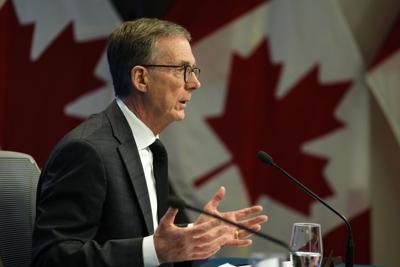The Bank of Canada says the Canadian economy would have been in a solid spot right now if it wasnŌĆÖt for U.S. President Donald TrumpŌĆÖs trade war, and it is worried that high levels of uncertainty could┬Ācreate┬Āfinancial market “dysfunction.”┬Ā
The bankŌĆÖs 2025 Financial Stability Report, released Thursday, said Canadians with a mortgage have managed their debt better than expected throughout 2024 while interest rates significantly dropped since June.
Meanwhile, insolvency filings by businesses have also fallen substantially, according to the report.
Those without a mortgage, however, are showing bigger signs of financial stress┬ĀŌĆö though rates of arrears on consumer credit products remain below historical averages, the report stated.
The prime minister said Canada would ŌĆ£neverŌĆØ join the United States but is willing to work with
The bank said that, overall, CanadaŌĆÖs financial institutions have not come under stress and┬Āare well positioned to handle higher credit losses in the future.┬Ā
ŌĆ£The countryŌĆÖs financial system has faced unprecedented shocks in recent years, and it has proven resilient,ŌĆØ Bank of Canada governor Tiff Macklem said in a press conference Thursday,┬Āciting the pandemic and the subsequent rise in inflation and interest rates.┬Ā
ŌĆ£Now the Canadian economy and financial system face a new threat,ŌĆØ he said. ŌĆ£U.S. trade policy has taken a dramatic protectionist shift. Tariffs and uncertainty have sharply reduced prospects for global economic growth. And financial markets have been rocked by chaotic policy announcements and reversals.ŌĆØ
The governor┬Āsaid central bankers have two key worries when it comes to Canadians’ future financial stability.
He┬Āwarned that a prolonged trade war would reduce economic growth and increase unemployment, putting pressure on Canada’s financial system and causing banks to cut back lending. This, in turn, would create greater financial stress for Canadians.┬Ā
The bank highlighted that a severe and long-lasting trade war could push the rate of mortgage arrears ŌĆö or late mortgage payments ŌĆö┬Ābeyond levels reached in the 2008 global financial crisis, but┬ĀMacklem called this a “pretty extreme scenario.”┬Ā ┬Ā
“While thatŌĆÖs not the central bankŌĆÖs base case forecast, itŌĆÖs a reminder of the urgency with which Canadian officials must address the trade spat with the U.S.,” Royce Mendes, economist at Desjardins, wrote┬Āin a note to clients.┬Ā
At the same time, the bank is increasingly concerned that TrumpŌĆÖs trade war will┬Ātrigger a ŌĆ£disorderlyŌĆØ market sell-off in the near-term, harming Canadian households and amplifying the risk of an economic slowdown.
In response to any U.S. tariffs, Canada should impose its own surtax on imports of U.S.
The report cited recent bouts of ŌĆ£extreme market volatility,ŌĆØ particularly when investors dumped stocks and traditionally stable U.S.┬Āgovernment bonds following TrumpŌĆÖs announcement of global ŌĆ£reciprocalŌĆØ tariffs on April 2.
ŌĆ£Government bond markets are the foundation of the financial system. They need to function smoothly for other markets to work,ŌĆØ said senior deputy governor Carolyn Rogers in prepared remarks.
ŌĆ£If the trade war causes a larger spike in volatility than we have seen so far, leveraged hedge funds might rush to sell their holdings. That could strain liquidity across core markets, increasing stress throughout the financial system,ŌĆØ she added.
The bank said it is monitoring signs of financial stress and is working closely with federal and provincial financial authorities to address potential emerging issues.
“We must remain vigilant. Vulnerabilities remain and there is a another test on the horizon,” said┬ĀRogers.┬Ā
This is a developing story.






























To join the conversation set a first and last name in your user profile.
Sign in or register for free to join the Conversation